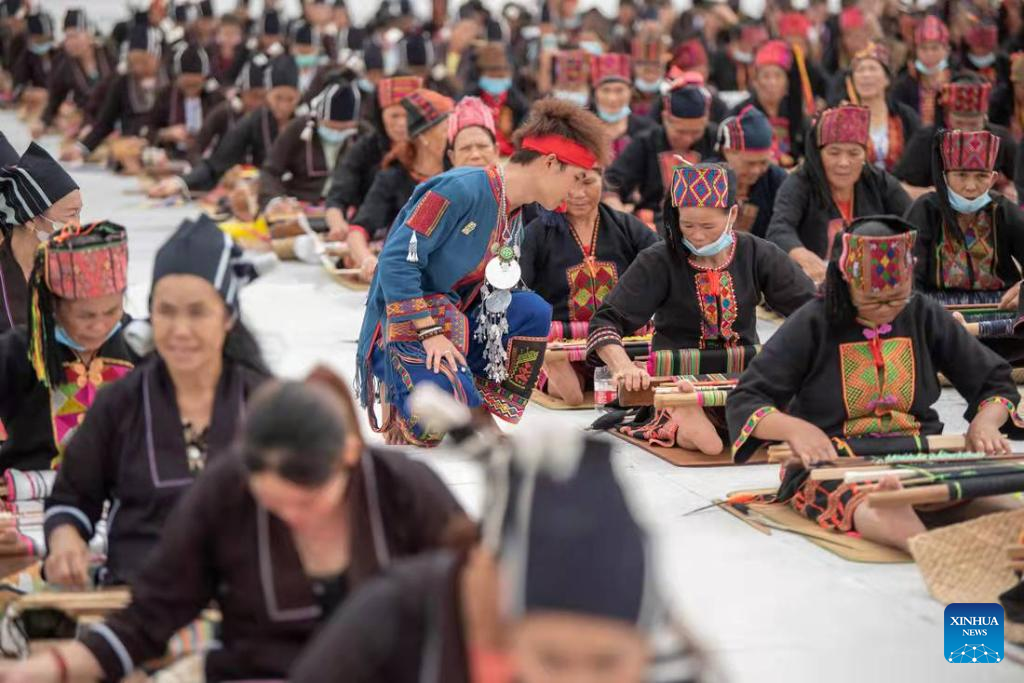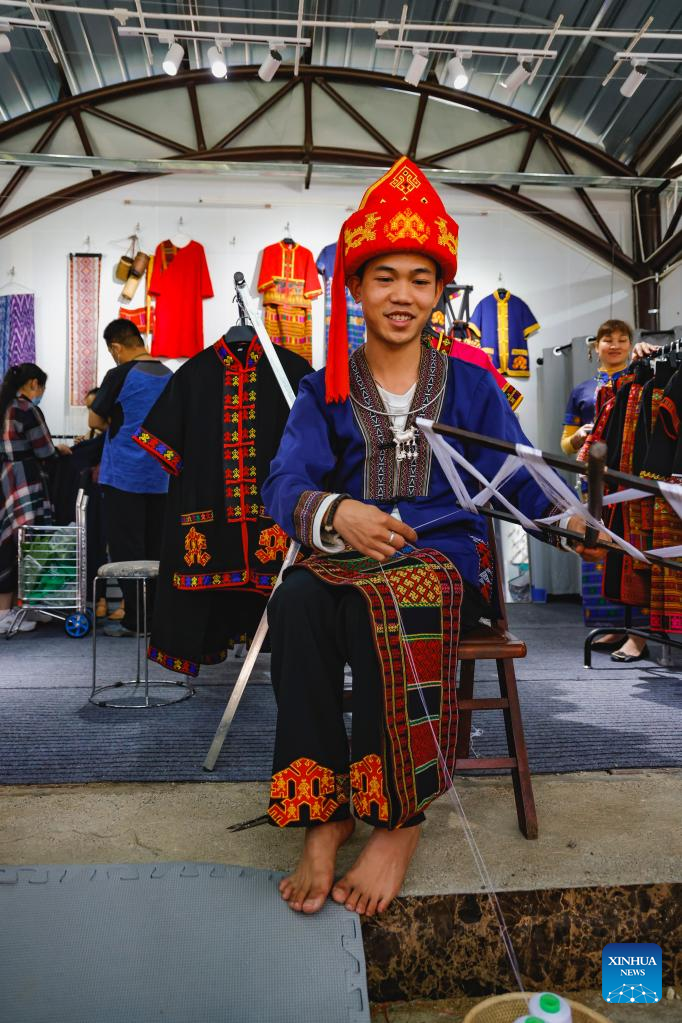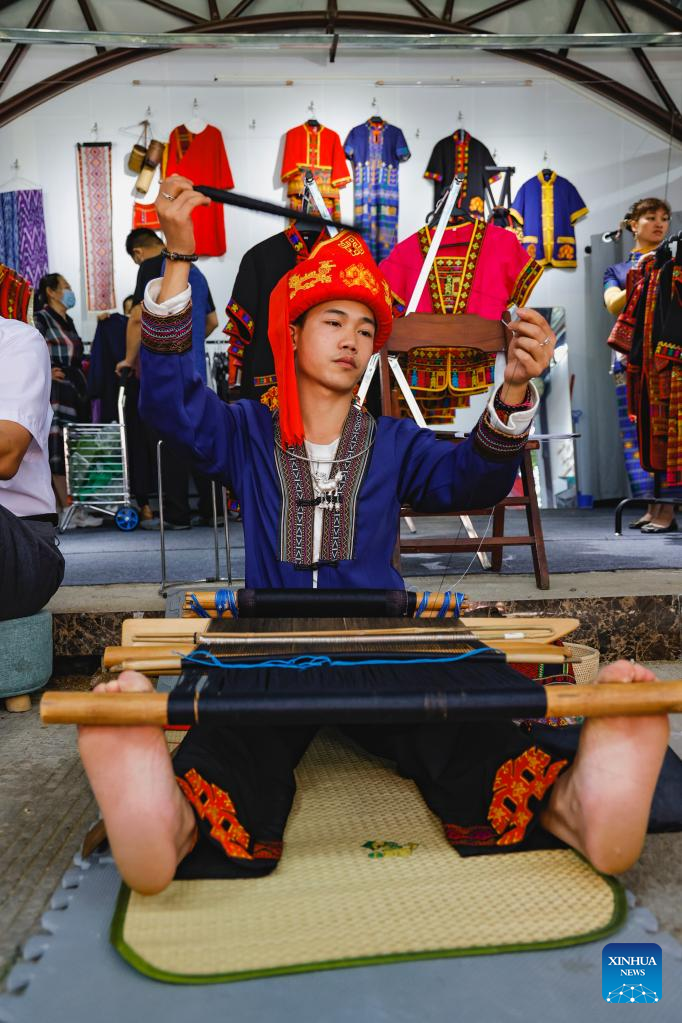
Undated file photo shows Huang Yangwei, a 24-year-old man of the Li ethnic minority, taking part in an event of Li ethnic brocade weaving in south China's Hainan Province. (Xinhua)
HAIKOU, Feb. 4 (Xinhua) -- During this year's Spring Festival holiday, Huang Yangwei's mother and elder sister were dressed up in new dresses with the Li ethnic brocade he had woven for them.
"It's just beautiful," said Huang's sister. "I love it."
Huang, 24, is a native of Maodao Township in Wuzhishan County, south China's Hainan Province. Born into a family of the Li ethnic minority, he was immersed in the Li culture as a kid, especially the Li ethnic brocade, which is famous for its bright, striking colors. But he had no idea how to weave it.
"My parents are lifetime farmers, and no one in the family really knew much about weaving the brocade," he said.
Huang did not know much about craftsmanship until he was in high school, when local authorities organized an event to introduce intangible cultural heritage into the school campus in 2016.
"I was fascinated instantly," he said.
Since then, he fell in love with the Li brocade and became the only boy in his home village who can weave the brocade.
"I developed a genuine and abiding love for the ethnic craft, but some villagers cannot understand why a man is addicted to weaving," he said. "They think it's a girl's thing." Undeterred, Huang continued chasing after his weaving dream.
The intangible cultural heritage of the Li brocade can trace back to over 3,000 years ago. In line with the Li tradition, the brocade weaving techniques are only "passed on to women, not to men," as in ancient China, men were supposed to do farm work while women were supposed to weave.
In recent years, Hainan education authorities have introduced the traditional brocade to local schools, so that the younger generation can understand and learn about the ethnic culture.
When Huang learned of the ancient craftsmanship in high school, he started weaving almost immediately.
"I gave my first handmade brocade piece to my mentor to express my gratitude for her guidance. It meant a lot to me," said Huang.
With great efforts, Huang made rapid progress and even won some awards in this regard.
In 2019, he was admitted to a college in the provincial capital Haikou to study business administration. But his passion for the Li brocade soared.
He kept practicing during his college years and tried to reinvent the traditional brocade patterns. For instance, the colors of the traditional Li brocade are mainly red and black. Huang combined green, pink and yellow in the brocade to bring out better visual effects.
Currently, Huang is busy weaving a traditional dress for a customer from Harbin, capital of Heilongjiang Province on the other end of the country. It is his first commercial order that he has spent over half a year on. "The lady expects to wear it during the Spring Festival. I want to make her wish come true," said Huang.
Huang cherishes every piece of the Li brocade he weaves by hand. "My brocades are just like my own kids," he said. He is reluctant to sell any of them, "unless the clients appreciate and understand the works and the Li culture."
In June, Huang will graduate from college. He has opened a clothing store with his elder sister, Huang Xueling, in Wuzhishan.
"I hope he sticks to his passion and ignores what others say," said the sister.
This year, Huang plans to weave a shirt with a tiger pattern on it to celebrate the Year of the Tiger, and he dreams of traveling to different places to learn about weaving skills from different cultures.
"I hope I can bring the Li ethnic culture to more parts of the world by weaving brocade," he said. Enditem.

File photo shows Huang Yangwei, a 24-year-old man of the Li ethnic minority, weaves the Li ethnic brocade, in south China's Hainan Province, on Nov. 27, 2021. (Xinhua)

File photo shows Huang Yangwei, a 24-year-old man of the Li ethnic minority, weaves the Li ethnic brocade, in south China's Hainan Province, on Nov. 27, 2021. (Xinhua)



